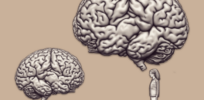IFL Science

Close cousins: Just 400,000 years ago, modern humans and Neanderthal lineages split, 100,000 years more recently than previous estimates
More evidence suggests that our species may have diverged from Neanderthals just 408,000 years ago, which is later than previous ...

Could another species of humans evolve? Yes, if we begin populating other planets
Along with Homo sapiens, at least eight other species of human have existed. Ultimately, just one species prevailed: Homo sapiens ...

Why do humans have large brains? It may be because humans begin having sex later in life than other mammals
A very brainy biologist has devised a computer model that recreates the development of our cognitive contraption ...

How gene editing crops can help address world hunger
One-tenth of the world’s population – 811 million people – were undernourished in 2020. That’s an increase of 161 million in just ...

Seafood of the future: Could lab-grown fish replace its wild and farmed relatives?
Do we need animals to make meat? What if we could grow cells outside the body of an animal to ...

Food crops could be engineered to summon wasps that kill deadly plant pests
Plagued by stemborers, a type of crop parasitism, maize can launch a chemical defense that essentially calls in the cavalry ...

Horrific genetic mutation starts as insomnia and ends in death
We've all had nights where we struggle to fall asleep, but imagine being trapped in a cycle of insomnia that gets progressively ...

Is climate change to blame for disappearing bumblebees?
[Researchers] have discovered one of the reasons why bumblebees are disappearing – global warming’s effect on flowering times. Scientists at ...

